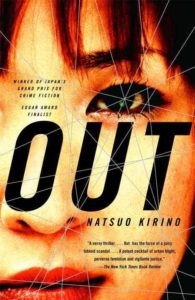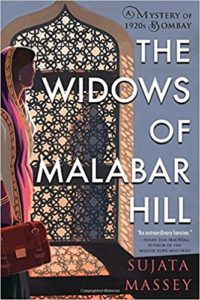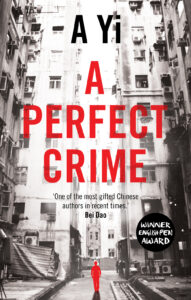When I was putting this list together, one thing became abundantly clear—thrillers (especially psychological thrillers) written in the east are starkly different from thrillers in the west. The west tends to embrace what I like to think of as “page-turners.” The stakes are high, the protagonist is usually on a clock of sorts, and, with a few notable exceptions, the focus is usually on the “who” rather than the “why.”
Thrillers coming from South-East Asia are usually paced very differently. Rather than immediately diving into solving the crime, these thrillers take their time—giving the reader a slightly claustrophobic look at the killers themselves, their motivations, and the situations that have lead them there. More often than not, the reader is fully aware of who the killer is from the very beginning, but must instead piece together the rationalization for their crimes. The stakes are still high, but the suspense is often a slow burn, with a very high payoff.
The locations where the stories are set also play their own role—giving us a look into the intricacies of the societies that set the stage for these crimes. You’ll find a lot of political and social commentary woven through these books— from the seedy, less talked about underbelly of Tokyo, to 1921 Bombay, where women were not admitted to the bar despite being qualified as lawyers.
As a lover of thrillers and suspense that takes place in non-typical settings, I was lucky enough to combine two very different locations in my own novel, My Sweet Girl.
First, we have Ratmalana, Sri Lanka, where the main character grows up in an atmospheric, gothic orphanage rich with folklore and ghost stories. And then we have the Bay Area, California, where the now-grown-up main character must navigate her way through suffocating suburbia, where she never felt like she was accepted.
It’s my pleasure to introduce you to some of my favorite reads set in South-East Asia. I truly hope it encourages you to add a few of these titles to your TBR pile!

The Good Son, by You-Jeong Jeong
Translated by Chi-Young Kim
Korea
Things feel off-kilter from the very start of this book, and in the best possible way. Yu-Jin, who has suffered from disorienting seizures since he was a child, wakes up to a metallic smell (which he associates with his episodes) and a phone call from his brother asking him whether everything is alright. His brother had missed a call from their mother in the middle of the night, which was strange since their mother usually followed a strict, clockwork-like routine. Yu-Jin turns on the lights to realize that his clothes and bed are caked in blood, and his bloody footprints lead downstairs to his mother’s dead body.
With no recollection of what happened the night before except for a faint memory of his mother calling out his name, Yu-Jin must piece together the events leading up to her death. Over three days, he unearths secrets buried from deep in his past and finally learns the truth about himself along with the sinister relationship he had with his mother.
A harrowing story told from the point of view of a man descending into madness, The Good Son is a slow burn that will leave you feeling deeply unsettled.

Nobody’s Child, by Kanchana Banerjee
India
A woman is found on the streets of Mumbai. She is dazed, with traces of drugs still in her system, and covered in injuries. Barely coherent, she introduces herself as Asavri Bhattacharya, the winner of the 2016 reality-talent show, Indian Koel. Except Asavri Bhattacharya died in a crash two years ago, soon after her win. The public mourned her death, and her body had been cremated. Hoping to prove her identity, Asavri starts to sing, and indeed, this leaves little room for doubt. But if she’s alive, then who was cremated two years ago?
The story revolves around a few plausible suspects—Tanya, the first runner up who received the title after Asavri’s death; Tanya’s mother Kamini Pratap Singh, a politician with a reputation for getting her way; and Avniel, the journalist who rose to fame after writing Asavri’s biography soon after she died.
What really happened to the singer is revealed in parts set in the present and the past, and calls out many of the darker, underlying issues that women face in Indian society.

Out, by Natsuo Kirino
Translated by Stephen Snyder
Japan
Set in the gritty underbelly of Tokyo, this book follows the lives of four women who work the night shift in a bento (boxed lunch) factory. Each comes with her own trials— from financial struggles, to being ignored by her husband and children. When Yayoi, the youngest of the women, calls Masako with the news that she has strangled her good-for-nothing, gambling husband who spent their money trying to impress a Chinese hostess, the women come to her aid. The plan appeared simple enough— they would cut up the body into pieces and dispose of it at various garbage collection sites.
However, the body (or rather, a part of it) is soon discovered by the police, who arrest a casino owner and pimp with a violent past and a grudge against Yayoi’s husband. Soon, the women must deal with the police, loan sharks, and the yakuza. A literary page-turner, Out is gritty, graphic, and not for the faint of heart.

The Widows of Malabar Hill, by Sujata Massey
India
Set in Bombay, 1921, the first female lawyer in India, Perveen Mistry has joined her father’s legal firm even though, being a woman, she isn’t allowed to appear in court herself. The firm is executing the will of Omar Farid, a wealthy Muslim mill owner whose three widows have all signed over their inheritance to a charity. Suspicious as to how they will support themselves, Perveen decides to investigate further.
Farid’s widows and their children live in purdah—which means they exist in strict seclusion, without leaving their quarters or speaking to any men—in their late husband’s mansion on Malabar Hill. Perveen’s investigations lead to the discovery of a body, and suspicions of a murderer within the Farid household.

A Perfect Crime, by A Yi
Translated by Anna Holmwood
China
Su, a teenage boy who lives with his aunt in provincial China, plans and executes the murder of his friend, disposes of her body in a washing machine, and flees town. This starts a chain of cat and mouse-like events where the local police try to hunt this young murderer, woven in with observations of lower-middle-class life in China. Su’s voice is strikingly calm and rational through the whole ordeal, even when he plans on strangling his friend, and his existential musings give us a glimpse into the mind of a killer. A chilling read, this is more of a why-dunit rather than a who-dunit.

What Lies Between Us, by Nayomi Munaweera
Sri Lanka
Presented as more of a beautifully crafted mystery than a fast-paced thriller, this story is narrated by a woman sitting in a jail cell. We know she has done something terrible—though we don’t find out what that is until much later on. Set in the beautiful hill country of central Sri Lanka, the narrator, known to us as Baby Madame, recounts her childhood. What seemed like an idyllic upbringing at first reveals itself to be something much darker, and ultimately results in the narrator and her mother seeking safety by immigrating to America.
Emotional and deeply moving, this book teases out the cyclical nature of trauma, the challenges faced by women in Sri Lanka, and the long reach of the past.
***


















